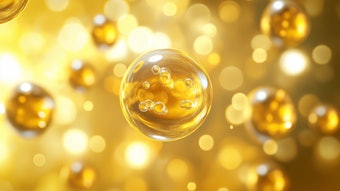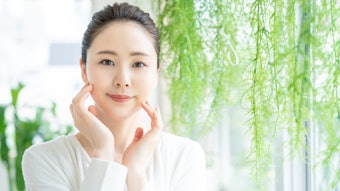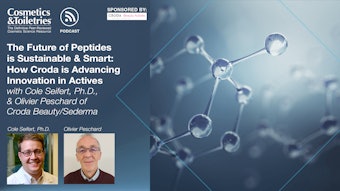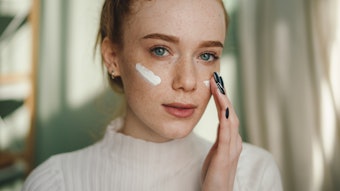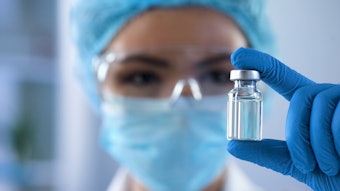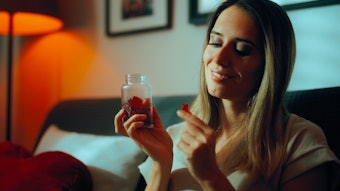Everything changes and everyone ages. Combining these two thoughts logically implies that one day we will not age any longer--and it is true; the day will arrive when we are either dead or, finally, the ultimate antiaging product has been created. I know which one of the two options I prefer. But are these indeed the right options?
Let me first differentiate between being alive and being young. The statements above deliberately make the mistake of interpreting antiaging as preventing us from passing on to "the other world," whereas that is not what cosmetic products do at all. That would definitely fall outside of the approved functions for what cosmetic products can do and, I believe, even outside of the approved functions for drugs.
Consumers prefer aging over the alternative--they want to get old but not to be old, i.e., look old. All we want is to stay younger for longer... How successful have we been until now? I have experienced living examples of elderly people proudly telling me their age, simply because their looks did not match their age. These have also been the only times that I have heard people of 30+ years proudly stating their age--because they looked significantly younger than their calendar age. But why then does not everybody look younger for longer, if it technically can be done?
Yes, we do indeed have great active ingredients that can prevent our collagen molecules from being hopelessly tangled; however, they are included at too low concentrations in formulations that may feel great but that do not necessarily deliver the active ingredient. On occasion, some obviously do get it right and the users of those products look younger for longer. But the rest of us, including me, have aged yet another year as we are heading into 2008. Our wrinkles keep deepening as the years go by... I ask you, if we have products that really do work and living examples to prove it, why have we not really solved the problem of antiaging yet?
We’re doing such great science to reveal the secrets of skin aging.... At the Annual Scientific Meeting and Technology Showcase of the SCC in December 2007, Leonard Guarente, PhD, of the Massachusetts Institute of Technology spoke about sirtuins, aging and diseases in the Frontiers of Science Award Lecture, sponsored by Cosmetics & Toiletries magazine.
According to Guarente, over the past decade or so, we have learned that a few critical genes seem to exert a disproportionate control over aging and life span in many organisms. Among these are the sirtuins, a group of related genes homologous to the yeast SIR2 that have been shown to possess antiaging functions in a wide variety of organisms. The silent information regulator (SIR2) family of protein deacetylases (sirtuins) are NAD(+)-dependent enzymes that are well-conserved in both eukaryotes and prokaryotes. Their biological activities include cell development, metabolism, apoptosis and heterochromatin formation.
The NAD requirement of SIR2 inextricably links it to metabolism, for which NAD and the reduced NADH are critical conduits. Why is this important, you may ask? Because this links antiaging to metabolism, in particular to what dieting can do for antiaging. It has been known for some time that calorie restriction leads to a few key metabolic adjustments, including improved glucose and lipids homeostasis that lower blood glucose and LDL-cholesterol (bad cholesterol) and raise insulin sensitivity and HDL-cholesterol (good cholesterol).
Only this century was it discovered that these beneficial effects are mediated via the SIR2-related sirtuins in yeasts and fruit flies; in mice, the mammalian SIR2 gene, SIRT1, is required. Two years earlier at the same SCC annual meeting, Claude dal Farra (then with Vincience, now with ISP) described SIRT1 as the human homologue of SIR2 and indicated that SIRT1 was expressed in human-cultured skin cells and in ex vivo skin and confirmed that its expression was related to stress.
Under moderate stress conditions, SIRT1 expression increases in a dose-related manner and inversely with p53 expression. Under strong stress conditions, the balance between SIRT1 and p53 shifts and p53 expression takes over. In "normal" English this means that in order to prevent aging, we need a small amount of stress. That is why a restricted calorie intake provides an antiaging benefit: both SIR2 and a low-calorie diet are needed to provide antiaging benefits.
And what did we just do over the festive season? Ate too much, drank too much and gave or received that latest antiaging product. The industry can create the best antiaging product in the world but that alone will not do. We also need to change our lifestyles. We need some stress, but only a little bit of metabolic stress--not the long-term excessive stress that comes free of charge from your boss, your partner, your children and your never-ending responsibilities.... And I know I am right. Once you realize the necessity of this little bit of stress, everything falls into place.
My good friend, Gavin Greenoak of the Australian Photobiology Testing Facility in Sydney, Australia, gave a beautiful talk at the in-cosmetics India show in Mumbai in November 2007 where, in his very last slide, he showed that mice that were only allowed to eat between 8am and 6pm had much higher minimal erythema dose (MED) values than mice that were allowed to eat ad libitum. Two days later, he repeated this talk at the Indian Pharmaceutical Association and indicated that Indians also had higher MEDs than the rest of mankind. This resulted in a discussion of why this could be.
One of the suggestions from the audience was that, in contrast to most other races, many Indians have been vegetarians for centuries. I hope you make the same connection. These mice whose food intake was limited to a few hours a day were under limited metabolic stress and had higher MEDs. Vegetarians seemingly live under limited metabolic stress and have higher MEDs. This healthy lifestyle is obviously good for them. But what do many of the rest of us do? We apply the best antiaging products while eating too much, drinking too much, working too much, sleeping too little and end up with so much stress that our p53 expression takes over. Too many “too's" in our lives, which is why even the best antiaging products do not work for us, unless we get the balance right between lifestyle and product use.
That is the great thing about writing a column on antiaging during the first week of January. It is not too (oops, "too" again) late to (that’s better) start a new resolution. Combine antiaging products with a healthy lifestyle to look great, too (oops)! Everything in moderation--less food, less drinks, less hassle, less carbon dioxide, less pollution and less work. This sounds OK, doesn’t it?
Guarente ended by quoting one of his colleagues, who claimed that if living with calorie restriction did not really make you live longer, it certainly did feel that way. But I would suggest everything in moderation, and all will be fine. I had better stop--after all, it’s Saturday. Why am I working?
Perhaps consumers should not use antiaging products as stand-alone products but include them in a lifestyle regimen with oral supplements--containing moderate stress factors like the benefits of calorie restriction, exercise, yoga and visits to the spa. I am sure our marketing friends would love this holistic approach to antiaging!I wish you all a very successful and relaxing 2008 with only that tiny bit of necessary stress.
Johann W. Wiechers, PhD
Technical Advisor, Allured Publishing Corp.
Independent Consultant in Cosmetic Science, JW Solutions
Gasthuispolderweg 30 2807 LL Gouda, The Netherlands
[email protected]
